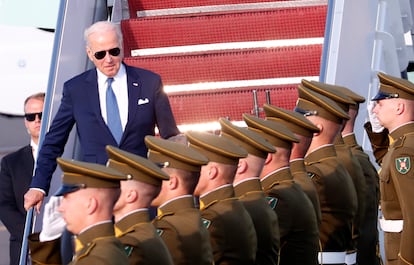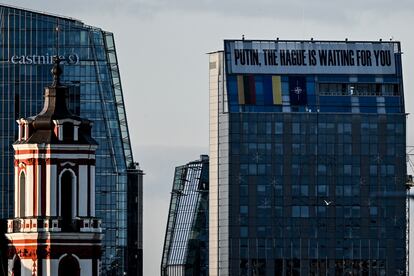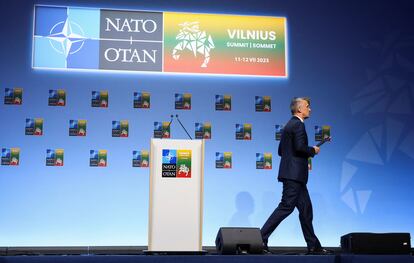US leads a pact to offer Ukraine ‘security guarantees’ at NATO summit
The initiative, which is supported by France, Germany and the United Kingdom, involves a commitment to continue to supply Kyiv with weapons, but does not set down a concrete timetable for the country’s accession into the Alliance, which is still a source of division

A year and a half after Russia launched its brutal full-scale war on Ukraine, NATO leaders are seeking to send a new message of unity and support to Kyiv at the Vilnius summit. However, not all the 31 Allies are on the same page. They agree on the need for language that makes it clear that Ukraine’s place is unequivocally within the Alliance, and that only NATO members and the aspiring country have a say in that decision. But as the decisive meeting in Lithuania kicks off on Tuesday, there are divisions on the statement on Ukraine’s sought-after membership to NATO.
Meanwhile, the United States, the United Kingdom, France and Germany are designing political pacts to offer Ukraine a security mechanism that guarantees that arms will continue to flow to the country, according to NATO sources. The objective of the framework agreement — which was advanced by EL PAÍS and could be announced on the margins of the summit and extended to the G-7 — is to create an armored shield around Ukraine that deters further attacks.
NATO has stated that Ukraine will not enter the Alliance until the war is over. The United States, the most powerful of the allies, has made it clear that the country, which has been fighting invading Russian troops for 503 days, is “not ready” for membership, as U.S. President Joe Biden stated on Sunday. Even Ukrainian President Volodymyr Zelenskiy seems to have accepted this. “We need a very firm and clear signal at the Vilnius summit that Ukraine has the right to become a NATO member after the war,” he stressed a few days ago. What Ukraine does want is a much more concrete promise than the vague declaration of “welcome” that it received at the 2008 Bucharest summit with Georgia. It wants a timetable for memberships and a clear commitment from NATO.
The 31 NATO countries are hoping that the Vilnius summit will provide a new sign of unity against Russia and make it clear that their support for Ukraine has no expiration date. However, the dilemma of how to deal with Ukraine’s NATO membership has created some dissonance. How they are resolved in the decisive meeting will depend on whether the Kremlin is able to capitalize on possible divisions. Although there are members with greater weight within NATO, all decisions are made unanimously. “Extraordinary times call for boldness, as NATO observers, friend and foe alike, will closely follow the summit outcomes,” says Camille Grand, an expert at the European Council on Foreign Relations (ECFR). “Achieving these goals would counteract Moscow’s belief that it can outlast the patience of the West,” adds the expert, who until 2022 held a senior position in NATO.
The United States and Germany are leading the group with the most pragmatic view on Ukraine’s membership commitments. They do not want future guarantees to be too specific and prefer to focus on immediate assistance. Meanwhile, the United Kingdom and, more recently, France, are committed to paving the way for Ukraine’s accession.
Furthermore, the Baltic countries and some Eastern allies are pressing not only to include a concrete promise of membership in the declaration, but also to demand a clear timetable. They support the idea that introducing Kyiv into the Alliance as soon as possible — now or when there is a ceasefire — is a win, as it shows that Ukraine has been able to resist the Kremlin’s aggression.

Security pledges
In parallel to the discussions on Ukraine’s NATO membership, several Allies are finalizing a security mechanism for the country. They are not the “security guarantees” included in Article 5 — an attack against one ally, is an attack against every member — but they seek to provide a “security arrangement” for Kyiv, according to the expressions used in the discussion. The United States, Germany and France are working on these mechanisms, but the plan could be extended to G-7 countries, according to sources. These political commitments will guarantee that Ukraine will continue to receive weapons, the technology to manufacture them, training for troops and the exchange of intelligence, diplomatic sources say.
Some describe the chosen model as the “porcupine formula,” similar to the one the United States maintains with Israel. This multilateral or bilateral integration of Kyiv into collective defense systems, even if through limited cooperation, is an interesting option, points out Claudia Major, from the German Institute for Foreign and Security Affairs. She believes, however, that this security mechanism is just a continuation of what they are already doing. “The most effective deterrent effect against Moscow could be achieved with Ukraine’s membership in NATO,” says the expert in an analysis.
Those commitments seek to secure support for Ukraine and form closer ties with the country until it becomes a member. But they do not commit to offering membership. There is no automatic path to enter NATO, and Ukraine first needs to reform the armed forces and reach more democratic standards. The leaders of the 31 Allies will approve an assistance plan of €550 million ($605 million) a year for several years to financially support Kyiv and to implement these changes so that its army adapts to NATO standards. Meanwhile, and in the absence of a calendar for accession, NATO is finalizing some of the bureaucratic steps that will accompany the future invitation, such as the so-called Membership Action Plan (MAP), which establishes the requirements to enter.

Ukraine’s Foreign Minister Dmytro Kuleba said on Monday that NATO countries had agreed to eliminate the Membership Action Plan for Ukraine. But NATO Secretary-General Jens Stoltenberg did not want to delve into the subject, and on Monday stressed that an agreement had not yet been reached. According to a source from NATO: “Nothing is agreed on until everything is agreed.”
However, the Oslo foreign ministers’ meeting in May, considered withdrawing the MAP requirement as a gesture towards Ukraine. The MAP can be replaced with the multi-year support plan that will be announced in Vilnius. The goal — for Ukraine to conform to NATO guidelines — is the same. NATO also guarantees that Ukraine will undertake democratic reforms through its candidacy to enter the EU. Kyiv wants to open negotiations before the end of the year and has to meet a series of requirements, such as the reform of its judicial system and laws on preventing oligarchies.
While Ukraine will overshadow many other key issues at the Vilnius summit, NATO leaders are also seeking to approve the Alliance’s biggest reorganization since the Cold War. The Allies are creating a secret document of more than 4,000 pages that they refer to as “regional plans.” These plans, as reported by EL PAÍS, seek to define responses to attacks according to geographical areas and different elements (air, space, land, cybernetic, maritime). They will also determine which forces are in charge of which areas and how many resources are available. Their focus is on Russia and terrorism.
Sign up for our weekly newsletter to get more English-language news coverage from EL PAÍS USA Edition
Tu suscripción se está usando en otro dispositivo
¿Quieres añadir otro usuario a tu suscripción?
Si continúas leyendo en este dispositivo, no se podrá leer en el otro.
FlechaTu suscripción se está usando en otro dispositivo y solo puedes acceder a EL PAÍS desde un dispositivo a la vez.
Si quieres compartir tu cuenta, cambia tu suscripción a la modalidad Premium, así podrás añadir otro usuario. Cada uno accederá con su propia cuenta de email, lo que os permitirá personalizar vuestra experiencia en EL PAÍS.
¿Tienes una suscripción de empresa? Accede aquí para contratar más cuentas.
En el caso de no saber quién está usando tu cuenta, te recomendamos cambiar tu contraseña aquí.
Si decides continuar compartiendo tu cuenta, este mensaje se mostrará en tu dispositivo y en el de la otra persona que está usando tu cuenta de forma indefinida, afectando a tu experiencia de lectura. Puedes consultar aquí los términos y condiciones de la suscripción digital.








































